COVER STORY:
Chai with a Legend: Ustad Amjad Ali Khan
Sarod Maestro Ustad Amjad Ali Khan was at the Indian Consulate in San Francisco, May 17. In this passionate interview, he fondly talks about his father and guru, his sons and the most important purpose of his life, music. A Siliconeer special feature.
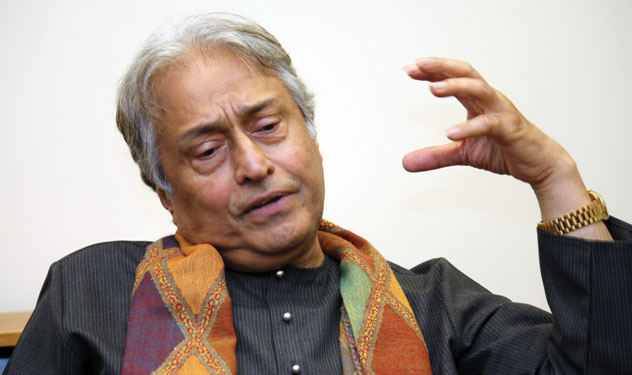
(Above): Sarod Maestro Ustad Amjad Ali Khan at the Indian Consulate in San Francisco, May 17. [Amar D. Gupta | Siliconeer photo]
The Consul General of India, N. Parthasarathi started with an outlook of the consulate’s activities and achievements. He pointed that the efficiency at the Consulate is at an all time high, citing examples of emails that were previously not always answered to now when they are promptly answered.
The Consulate is also taking a more active role in bringing the culture of India to the people of the San Francisco Bay Area.
To further ease the congestion at the Consulate and expedite services, it has now outsourced Passport services to a third-party, VFS.
The Consul General reassured that if someone had any problems related to the Consulate’s activities, they were always welcome to come over and voice their concerns and it would be dealt with immediately or at the first available instance.
That said, he presented one of India’s many cultural icons, Sarod maestro Ustad Amjad Ali Khan, an exponent of the Gwalior gharana of music in India.
Ustad Amjad Ali Khan teaches at various universities all over the world during summer and he is currently teaching at Stanford University for a short time. He has a Web site www.sarod.com where interested readers can get more information on his activities.
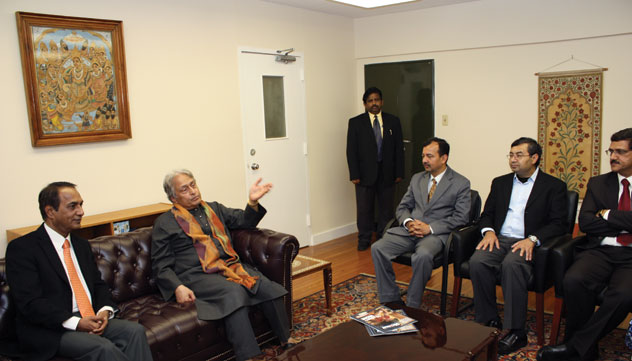
(Above): Sarod Maestro Ustad Amjad Ali Khan (2nd from l) at the Indian Consulate in San Francisco, May 17 with office bearers at the Indian Consulate and one of his students (2nd from r). [Amar D. Gupta | Siliconeer photo]
Here are excerpts from what Ustadji shared with us:
Thanking the Consul General for this opportunity, Ustad Amjad Ali Khan said, “America has a very special place for me because as a child and young musician in 1963, my first foreign tour was that of America, on the invitation of Asia Society. This happened as I was still in school. My father was uncomfortable to send me away because he was one of the musicians who never traveled in a plane. He was always afraid of flying. That was a different generation. I was the youngest child. His contemporary musicians were Ustad Faiyaz Khan, Abdul Karim Khan sahib, Alauddin Khan sahib, Srinivas Aiyyer. They were a different generation. When everybody persuaded him, he allowed me to fly to U.S.
I still remember, when I was returning from my visit, he had come to the airport to receive me. I was very fortunate that I had such a father and guru, so I could carry on the old world culture.
I am trying to balance tradition and Westernization. I am also indebted to USA because they have given me honorary citizenship of six – seven states. The greatest surprise was on April 20, 1984 when the governor of Massachusetts, Michael Dukakis declared April 20 as ‘Amjad Ali Khan Day’ because I was performing in Boston on that day. Some concerts become memorable concerts. As Mr. Parthasarathi was mentioning, Belgium, that was also a very memorable concert.”

(Above): San Francisco's Consul General of India N. Parthasarathi and Sarod Maestro Ustad Amjad Ali Khan at the Indian Consulate in San Francisco, May 17. [Amar D. Gupta | Siliconeer photo]
Amjad Ali Khan has been patronized by many performers in India like Bismillah Khan and Vilayat Khan. “Music has connected the world. In India music is not just a fine art, it is a way of life and it connects you to God. Swar hi eeshwar hai!”
“I often say that there are only two types of music in the world. One is pure sound like the sound of symphony, sarod, sitar or even human voice which has no language.” He sings a line, and continues, “This is pure sound. Thank God I belong to the world of sound. The other kind is that of language, story and songs. South Indian, North Indian, Bengali and all other songs.
With due respect to all writers, language does create barriers. Music has the most important role in the world, to connect. We forget whether it is Indian music or European music. We don’t want to know which music, but, if it is appealing music, you are drawn towards it.”
On his interest in teaching, Ustadji said, “ I have many disciples in India. They play sarod. In Stanford I am not teaching sarod. I am teaching music in general.”
“What is the importance of oral tradition?
Everything is written. European composers wrote music. Musicians read music. I admire their system. The science of music was so advanced even five thousand years back that they discovered these several notes, do, re, mi, fa, so, la, ti, or saa, re, gaa, maa, paa, dha, ni… together we have the same twelve notes that is used the world over. The world has discovered cell phones, fax machines, iPods, iPads, keyboards, but no one has created the thirteenth note of music. The musical notes remain twelve as discovered ages ago. So the sound of music is really a precious gift of God.”
“In Stanford University I have about 30-35 students. Kamal Haider is one of them, though he is into IT business, he plays sitar. He doesn’t bring his sitar, and I don’t want everybody to bring their instruments either. I say, you must feel music. That’s most important. Everybody can read music, write music, talk music or perform music, but to feel music, it is very important.”
“In the oral tradition, the students sing instead of playing notes on their instruments. I make them realize the ocean of music and the ocean of rhythm. In European music, they have not given importance to rhythm. It is a very simple rhythm that they use in symphonies. On the contrary, in our own Indian Classical music, rhythm is as complex as raaga music.”
On his upcoming concerts, he mentioned about the upcoming performances in early June. He has also composed an album for Scottish Chamber Orchestra called Samaagam, which has compositions by Ustadji and has 40-50 musicians playing their instruments along with him on sarod. The June concerts will feature some of these compositions as he plays with the Stanford Philharmonia Orchestra.
“I have spent most of my time in New York and in the Eastern part of U.S. I have never spent time here in Bay Area before. I was mostly here for concerts and left within a day or two,” he said, adding, “My whole family is here now. Amaan, Ayaan and my wife are all here. We are enjoying the weather and natural scenery, traveling and having a good time. I would like to come here more often, every year to teach and to relax.”
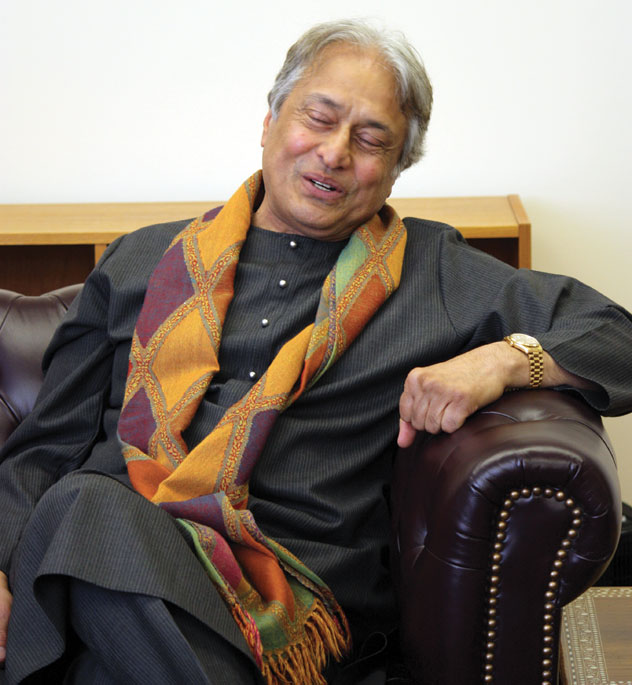
(Above): Sarod Maestro Ustad Amjad Ali Khan fondly remembers his childhood at the Indian Consulate in San Francisco, May 17. [Amar D. Gupta | Siliconeer photo]
Last year Ustad Amjad Ali Khan and his troupe performed at the United Nations to pay tribute to victims of 9-11. “Any violence that happens anywhere in the world, we feel very sorry, we feel sad about it,” said Ustadji. “I didn’t spend much time with books. My world was sound and anytime I sat to read anything, I would go to sleep. People who spend a lot of time with books, now that everything is institutionalized, people are learning music through books. From institutions, you become musicologist. You get degrees, diplomas and your life is secure that you will get a job. But for people like us, we give our life to God. We don’t know what tomorrow will bring and accept each day on the face of it.” “Kal ka pata pehle bhi nahi tha, aaj bhi nahi hai, but one has to believe in God and guru. Music is not just a profession for me, it’s a passion. It’s a way of life. We are into this world of music to understand music.”
“There were some great composers in India, Saint Tyagaraja, Muthuswami Dikshitar, Shyama Shastri, Tansen Swami Haridas, who were pillars of Indian music. Once I had the honor of visiting Tyagaraja’s samadhi in Thanjavur (A town on the banks of Kaveri river in South India). The condition was that one had to play the composition of Tyagaraja. A South Indian musician had brought a book of Tyagaraja’s compositions. One of the compositions that I liked was where he was saying to Lord Rama, “O’ Lord is it possible for me in this lifetime to understand the meaning of these seven notes. The depth of these seven notes… do, re, mi, fa, so, la, ti.” They built castles through these seven notes but unfortunately today, instead of tapasya (austerity) to understand music, people are doing tapasya to short-cut in life. The keyboard is a classic example. It can produce the sound of flute and many other instruments, but thank God, there is no sarod there. The keyboard has ruined the lives of so many authentic musicians,” laments Ustadji.
“One has to give credit to Japan or whichever country has released these keyboards, it is a good toy for kids.
It is very nice to see people being connected to music, especially children in America, in Europe, the western world where children are exposed to music at a young age, while in India, parents allow girls to be musicians and not the boys, because the boy has to earn. Inspite of that, jisko josh aa jaata hai (one who finds a passion in music) doesn’t need the permission of parents! Anybody can become a musician, but there are very few performing artists from the institutions, as there, you spend more time with books than music.”
“Historically, Classical musicians had to serve the guru, surrender to the guru, give their life to God, and that is why most of the Classical musicians have come from the ‘guru shishya parampara’ (ancient tradition of teacher and student relationship), and not from any institution.”
“Today people learn music to go to reality shows, but how many are learning music to understand music. I was very surprised at the answer of one of my students when I asked him about the expectations he had from completing the music course I was offering. He said, “I will try to get a job in an orchestra and if I don’t get that, I will teach.” I was pleasantly surprised as in India, a teacher doesn’t have that kind of status whereas in the Western world, a teacher has a much larger stature, even the word artist means a lot more here, and also the concert halls here are like monuments, be it the Palace of Fine Arts, Carnegie Hall, Albert Hall or Kennedy Center.”
“We need to have a concert hall of international repute in India. Maintenance is a key area to focus on, we have built good halls but they are not well maintained,” says Ustadji.
“A good audience inspires you to give your best,” he adds.
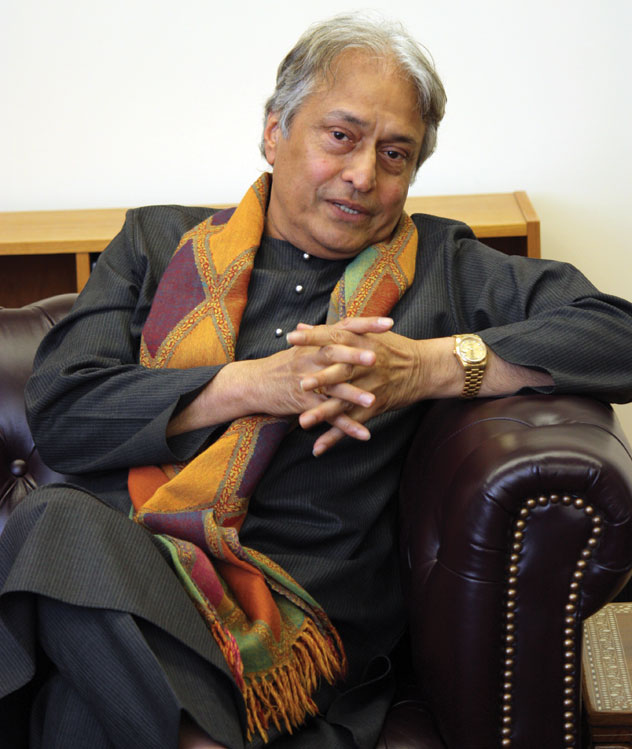
(Above): Sarod Maestro Ustad Amjad Ali Khan shares his vast knowledge of Hindustani music at the Indian Consulate in San Francisco, May 17. [Amar D. Gupta | Siliconeer photo]
Most classical musicians follow convention when they present a concert. There is a slight difference between convention and tradition. “I don’t respect the word convention because you are committed to do what has happened earlier,” he says. “For instance, one tabla player had a long moustache. When I asked him, why, he said his grandfather had it so now he had it. That is a conventional way to present himself that he follows.”
“To stretch the raaga. My father, Hafiz Ali Khan, was a purist. When he received Padma Bhushan from Dr. Rajendra Prasad, the first President of India, he took me along. I was a young boy at that time. When people came to talk to him after the presentation, Dr. Rajendra Prasad came to my father and said, “Khansahib what can I do for you?” My father said, “You are the President of India. You must protect the purity of Raag Darbari.” I was feeling embarrassed on his request. Whether the President knew what Raag Darbari meant or not, I wasn’t so sure.
The President said, “Khansahib main samjha nahin” (I do not understand what it means). My father explained, Darbari was created by Tansen and now people are taking liberty. This raaga will lose its purity. Since you are the President, you must protect this from happening. The President got worried and said he would look into it, is there anything else he could do. My father said no, now it is time for my prayer and he walked away, not knowing that protocol does not allow anybody to leave before the President.”
My father introduced me to Nehru. Nehru had a great sense of humor. He quickly said, “I hope you are not hiding anything from him like some guru mantra. I hope you are teaching him everything.”
“Such people came to this world. For them music was everything. He was a real representative of this art and tradition. He didn’t ask for anything, having faith in God that everything would be all right,” said Ustadji as he remembered the fond memories of his childhood and the special moments he shared with his father.
For those who are here and have kids, and who still follow the art, culture and traditions of India, Ustadji said, “The most important advice I can give is to be tolerant and patient. Arrogance is a disease worse than cancer. Education could not create kindness and compassion in our society. In addition to English, Mathematics, and books, children should be taught with great attention, the value of love, compassion and kindness and non-voilence.” If education provokes people to be intolerant towards others, towards religion and to be violent, thank God, I did not go to college. It was a different world for me. I was learning so much from my father at home. In schools you would have to say “good morning sir, good morning madam” while at home I learned haath jodo, pair chuo. (join hands when greeting others, touch the feet of elders as a respect to them). To balance between Western culture and Indian traditions has always been challenging for me.”
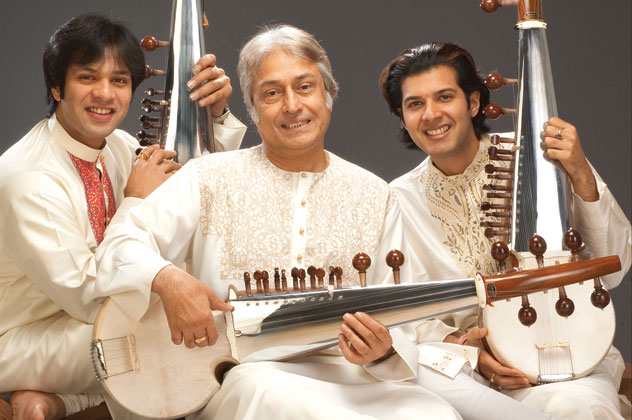
(Above): Ustad Amjad Ali Khan with sons, Amaan (l) and Ayaan (r). [Photo: Suvo Das]
You’ve spoken very fondly about your father. Tell us something about your sons.
“They are the seventh generation of our clan. Thank God they have completed school. All their friends are talking about planes, cars, diamonds, jewelry, and then they kid my sons for being musicians, that too in Delhi.”
“The flavor of South is different, Bengal is different, Maharashtra is different, but to raise children in Delhi is something else.”
“But anyway, God helps. They could balance and manage their social life and music lessons well. They practiced every day in the afternoon.”
“We need to learn as parents how to nurture our kids and train them. To transmit and create their interest in music, I made songs they would find interesting. In fact, I have an album just for children that I created, with songs such as an Indian version of “Happy Birthday to You.” After two hundred years of British influence, India did not have a happy birthday song in its own language. It goes like this, “Aao hum sab milen, naache aur gayen, Ki Raju ki saalgirah hai … .” To teach the message of religion, I created a song, “Ya Mohammad, Jesus Christ, Gautam Buddha, Guru Nanak ji, hum aapke bachche hain, apni sharan mein rakhna … .” Children used to sing this on Doordarshan (India’s State-run TV Station). School children sing this song in schools in Delhi.
This was my approach, to gradually make them aware and interested in Hindustani music.”
“In our field, I can’t just say, today I present Amaan as a sarod player. And nobody can become a superstar overnight. Both Amaan and Ayaan are very committed, kind and compassionate.”
“We don’t always play together. Sometimes Amaan and Ayaan play solo, sometimes they play together and then there are concerts where we all play together.”
“We have some concerts here lined up for October, later this year, and in February of next year.”
“Amaan and Ayaan are still young performers. People always compare them to their seniors, which is sad. Amaan has his own style. You may be the disciple of the same guru but you still have to have your own identity. It is a great achievement.”
“There was once a king who patronized a musician. This performer would drink every night and then say a lot of unpleasant things under the influence. Once he did that to the king’s subordinate. The subordinate came to the king and said he would leave the king unless something was done about the musician, the reason being the unpleasant exchange he had with the musician when the latter was drunk.
The king said to the subordinate that he could not stop him from leaving but could always replace him with some other subordinate, however, if the subordinate could find an identical musician and bring him to the king, then he would punish the drunk musician otherwise he could not risk losing the musician as there was no one to replace him.”
“So, in order to recognize real talent, it takes a lot of effort and courage. The irony today is that you want to make a thousand Tansens in order to please everyone, but in reality Tansen was and always will be one.”
“In the generation of Amaan and Ayaan, they are still totally committed to their art. It is this commitment that will take them far. Indian Classical music always had a lot of depth, and that has helped it stand the test of time for hundreds of years.”
“If you take shehnai, a name comes to mind instantly, Ustad Bismillah Khan. He lived in Varanasi. Today we are talking of boiled water, mineral water, but for him, he has always had the same water available to him, one that Ganges has to offer. He led a very simple life, didn’t have a lot, but he had old values. He was playing till he was in his nineties when he passed away. Simplicity, austerity and commitment are some very important key ingredients of being a successful musician.”
“Once there was a concert where I was playing. It was a long concert with many classical singers and musicians and they all played a different raaga. By the time it was my turn, Pandit Bhimsen Joshi had already sung the raaga I was going to play. So I had to come up with a new raaga. I came up with Lalita Dhwani, performing it from three in the morning to about seven in the morning. Ustad Bismillah Khan was in audience listening to it. What he said after the concert was probably the biggest compliment for me.”
“He said, when you started playing and struck some notes, I was about to leave as it was time for my prayers. However, the notes were so intense that I was in two minds about whether to go to pray or listen to your performance. In the end, I decided to stay as I thought this was something real, intense and close to me as the prayers.”
“My most precious award is the satisfaction and appreciation of my listeners. No award is bigger than a successful concert.”
|